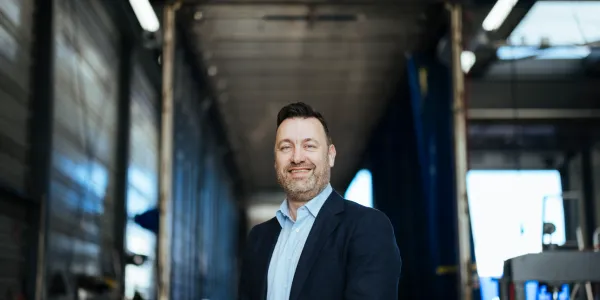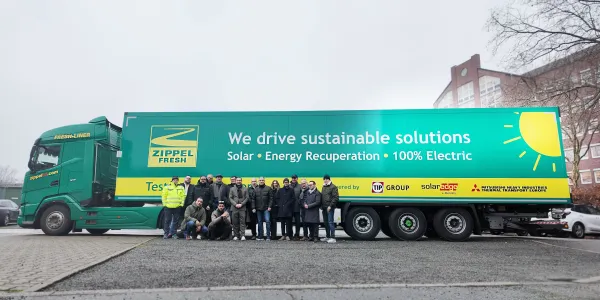Sustainable cooling solutions: focus on three Electric Reefers innovations

The transportation of perishable goods, such as food, medicine and chemicals, necessitates the use of refrigerated vehicles (reefer). However, they have a substantial environmental impact in terms of energy consumption and emissions.
To address these challenges, it is crucial to transition to electric-powered reefers, the E-Reefer, which offer a greener alternative while maintaining the safety and efficiency of cold chain logistics.
Several innovative solutions are currently being developed to make this transition a reality, such as the utilization of energy recuperation axles, solar panels and charging through the grid.
This transition can be done for new units to go fully electric or for existing diesel reefers by doing a retrofit to electric.
We have the ambition to partner with its customers in the electrification of their cold-chain fleet, to make sure in the nearby future reefers run entirely on renewable electricity. TIP Group ambition is to guide our customers in their net-zero journey with the electrification of their cold-chain fleet.
We have been testing and piloting 3 separate e-reefer innovations: plug-in battery only, solar-powered and energy recuperation axle where the primary energy source in all three is a battery pack. Discover in this article what is the current state of these innovations, and how you can electrify your fleet.
TIP is committed to supporting our customers in their decarbonization efforts and helping them achieve their individual climate goals, which align with our ambition to become climate neutral by 2050. To assist you in significantly reducing CO2 emissions and diesel consumption in your fleet's refrigeration units (reefers), TIP is actively working on several customer-centric initiatives:
• Battery-only e-reefer
• Energy recuperation axle e-reefer
• Solar-powered e-reefer
These innovative solutions are designed to enhance your sustainability efforts and contribute to the reduction of your carbon footprint.
Let’s review the current status of each of these initiatives.
Fleet-ready cooling: the plug-in battery only e-reefer
The battery-only solution is the best option for customers that have charging infrastructure available at their loading/unloading or parking location, with only few door openings in their driving routes.
A standout illustration of successful testing is the collaboration with Unilever, DLG, and maxwell+spark in the Netherlands. This partnership effectively showcased the transition from traditional diesel refrigeration systems to battery-electric prototypes. Commencing in 2021, the initiative aimed at reducing CO2 emissions by utilizing 100% green energy for temperature-controlled transport, with each unit potentially saving 20-25 tons of CO2 annually. The trial, which extended over several months, saw electric systems save over 99% of fossil fuels, marking a significant stride toward net-zero carbon emissions in refrigerated transport, and showcasing a promising prospect for broader implementation across the sector.

After 24 months of testing and data collection, Battery Only powered E-Reefers have now been fully adopted and are available in our Mediterranean and Benelux TIP fleets.
Find more information here: [E-Reefer Brochure - Battery Only]
Overcoming grid access challenges with the Energy Recuperation Axle e-reefer
The energy recuperation axle is the best solution for customers that have limited accessibility to grid connection and have regular braking in their driving routes.
This new technology turns the energy, typically lost by a trailer during transit, into clean, sustainable power for refrigerated tailer units. Lost energy is the energy that is generated when the vehicle rolls or brakes through axle generators and is stored in a high-voltage battery. While the vehicle is in motion, the energy axle charges the battery which then supply the power toward the refrigeration system.

The results from our 5+ years of testing are very positive. In 2023, we are working with three transport companies that are driving for Albert Heijn – the largest supermarket chain in the Netherlands – for a 12-month join pilot with Thermo King and BPW.
The Energy Recuperation Axle e-reefer solution is now fully adopted by TIP with 18 months of operational experience under our belt. This solution is ideal for city distribution, as it is less grid dependent, and allows for limited to frequent door openings.
Find more information here: [E-Reefer Brochure - Energy Recuperation Axle]
Investigating a third sustainable solution: the Solar-powered e-reefer
A solar-powered e-reefer is a configuration where a reefer is fitted with solar panels on the roof which are the used to generate energy for the built-in batteries which then supply the refrigeration system with power.
TIP Group, in collaboration with Valoe Corporation and Frigoscandia, initiated a pilot project in the Nordics, deploying a solar-powered refrigerated trailer to promote cleaner road freight. The overarching goal is to significantly reduce CO2 emissions, thereby advancing TIP's environmental sustainability agenda in the refrigerated transport sector.
“The first results of the solar-powered e-reefer with Valoe are very promising.” explains Rogier Laan, Vice President Sales and Marketing at TIP Group. “We strongly believe that diesel temperature-controlled trailers will quickly fade-out in favour of fully electrical and we are here to drive and support that transition! The initial results show that the Solar-powered solution would be ideal for situations with sufficient exposure to daylight and where grid access might be limited. The solution works optimally with limited to moderate door openings.”

Another initiative saw TIP partnering with Sunswap to launch “Endurance," a solar and battery-powered TRU set for a twelve-month pilot starting in 2024. In this pilot, the units are capable of operating solely on solar energy, will test the system as an eco-friendly alternative to diesel-powered refrigeration. The solution can potentially save up to 90% of operational costs compared to diesel refrigerators, and significantly reduce carbon emissions in the cold chain transport sector.
Once the pilot results will confirm the effectiveness of this solution, TIP will make it available to its customers. This solution will be the best for customers that have limited accessibility to grid connection, with trailers that are often exposed to light when parked.
We help you find the best e-reefer solution for your business
We want to empower our customers in their net-zero journey by supporting them in the adoption of the best climate neutral solutions for their cold-chain fleet.
For this, we offer zero and low emission vehicles, complemented by comprehensive fleet services, including vehicle refurbishment, that prioritize environmental responsibility. We also have developed a dedicated ESG calculation model to advice best our customers when choosing an e-reefer solution.
Visit your French market or Dutch market to know more about available e-reefer technologies and discover how to e-power your fleet.



